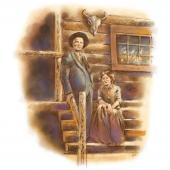Last Best Books: "Life of the Afterlife in the Big Sky State," "The Only Good Indians"

The Life of the Afterlife in the Big Sky State: A History of Montana Cemeteries
by Ellen Baumler
Ellen Baumler, who we are proud to claim as an occasional contributor to this magazine, is a boon to the crowded field of writing about Montana’s history. Her books are always intensively researched, clearly and evocatively written, and are of interest to both academics and to the general reader.
This book is both an exhaustively studied history of funerary arrangements in Montana from its prehistory to the 21st century and a collection of marvelous anecdotes about the ways that Montanans have succumbed to, marked, observed, and grieved over death.
One story tells of the bizarre and tragic death of Dillon’s Evangeline “Eva Clark” Bird, who at 15 was serving as the assistant to magician Charles Lewis. She went to retrieve a hat from a trunk, and as she rifled through its contents, she somehow accidentally discharged the pistol into her own head. Suspicion immediately fell on the magician, but after multiple people, including the girl’s mother, said that there was no way that the kindly magician could have killed her, he was found not guilty.
The book is generously stuffed with tales like that: alternately grim, moving, or blackly humorous. Here too are the stories of Fort Benton’s legendary Shep, memorialized for his eternal canine faithfulness, and poor Old Pitt, the beloved, elderly circus elephant who was hit by a bolt of lightning through the big top tent while performing in 1943. She was given a granite marker, the inscription on which ends with the simple phrase, “May God Bless Her.”
The Life of the Afterlife in the Big Sky State is highly recommended both for the scholar and the casual reader. Baumler has done a wonderful job of showing how the way we have historically tended to the dead in Montana can shed light on the lives of those who survived—to mourn, to remember, and to continue on.

The Only Good Indians
by Stephen Graham Jones
Set in Great Falls and the Blackfoot Reservation on the Hi-Line, The Only Good Indians tells the story of four American Indian men who are made to atone for a youthful sin against nature and tradition. Ten years ago, they gunned down more elk than they could take—including one pregnant cow—on land set aside for elders, and then wasted the meat.
Ten years later, some of the men have left the reservation, and some are still living there. Some have children, some don’t; some are married, and some aren’t. Some of them are haunted by what they did that day, and others are cavalier about it. But by the end of this obsidian-sharp, terrifying, and unexpectedly funny novel, each of the four will meet the spirit of anger and vengeance they inadvertently unleashed on the world that snowy day, a supernatural force aptly called Elk Head Woman.
The Only Good Indians is reminiscent of a lot of pop culture. There’s a dash of Stephen King’s It in the tail of grown-ups having to come to terms with their childhoods, while the exploration of racial experience and sly commentary recalls Jordan Peele’s Get Out. At times, its shape-shifting antagonist brings Peter Straub’s Ghost Story to mind. All in all, that’s some pretty good company to keep for a horror writer. But by mixing all of that with the authentic portrayal of Blackfoot culture and a remarkable ear for the rhythms of dialogue, The Only Good Indians becomes something exceptional. Why not read it before it inevitably gets turned into an inferior movie?
But most importantly, it’s a damned good yarn, and one that this reviewer finished in two long sittings. He would have made it one if it weren’t for the fact that he had to go to bed in between. And, worse yet, it was a troubled sleep, since he kept waking up and searching the corners of the room for antlers.
I can’t put it any simpler than this: I’d easily recommend the novel to anyone who ever broke the spine of a well-worn copy of a Stephen King novel. Those folks will be in hog heaven. But it should not be missed by those interested in the Hi-Line, or novels of indigenous people, or even those who broadly enjoy the literature of the West, either. Like the best horror, The Only Good Indians transcends.












Leave a Comment Here